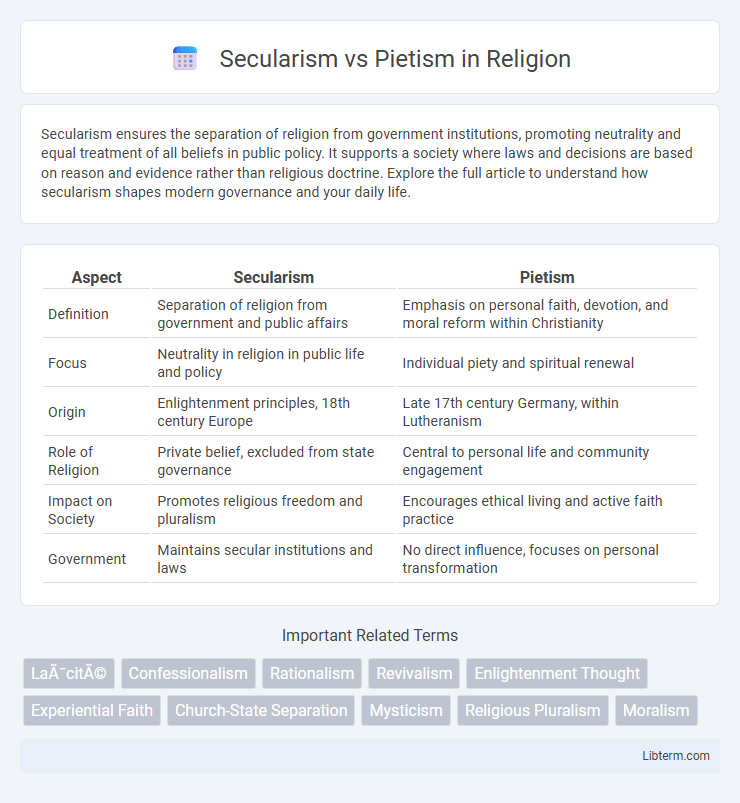Secularism ensures the separation of religion from government institutions, promoting neutrality and equal treatment of all beliefs in public policy. It supports a society where laws and decisions are based on reason and evidence rather than religious doctrine. Explore the full article to understand how secularism shapes modern governance and your daily life.
Table of Comparison
| Aspect | Secularism | Pietism |
|---|---|---|
| Definition | Separation of religion from government and public affairs | Emphasis on personal faith, devotion, and moral reform within Christianity |
| Focus | Neutrality in religion in public life and policy | Individual piety and spiritual renewal |
| Origin | Enlightenment principles, 18th century Europe | Late 17th century Germany, within Lutheranism |
| Role of Religion | Private belief, excluded from state governance | Central to personal life and community engagement |
| Impact on Society | Promotes religious freedom and pluralism | Encourages ethical living and active faith practice |
| Government | Maintains secular institutions and laws | No direct influence, focuses on personal transformation |
Understanding Secularism: Definition and Core Principles
Secularism is a principle that advocates for the separation of religion from governmental institutions and public affairs, emphasizing neutrality in matters of faith. Its core principles include promoting a society where religious beliefs do not influence laws, policies, or education, ensuring equal treatment of all citizens regardless of religious affiliation. Secularism seeks to protect individual freedom of conscience while maintaining a public sphere free from religious dominance.
Pietism Explained: Historical Roots and Beliefs
Pietism emerged in the late 17th century within Lutheranism, emphasizing personal faith, heartfelt devotion, and practical Christian living over formal doctrine and church rituals. It originated as a reaction to perceived spiritual deadness in established churches, advocating for Bible study, small group fellowship, and ethical conduct as means to revive sincere piety. Core beliefs of Pietism include the importance of individual conversion, sanctification through inward spiritual renewal, and active expression of faith in daily life.
Historical Context: Evolution of Secularism and Pietism
Secularism evolved during the Enlightenment as a framework separating religion from government and public affairs, emphasizing rationality and scientific inquiry over spiritual authority. Pietism emerged in the late 17th century within Lutheranism, advocating personal piety, heartfelt devotion, and moral renewal against formalism and institutional religion. The historical context of both movements reflects a broader cultural shift: secularism promoted individual freedom from ecclesiastical control, while pietism sought to reinvigorate religious experience through personal faith and ethical living.
Key Differences Between Secularism and Pietism
Secularism advocates for the separation of religion from public affairs, emphasizing rationality, scientific inquiry, and individual freedoms without religious influence. Pietism, rooted in a Christian revival movement, prioritizes personal faith, spiritual renewal, and moral living based on religious devotion and scriptural authority. The key differences lie in secularism's focus on a non-religious public sphere versus pietism's emphasis on deep personal religious commitment and experiential faith.
Major Influences on Society: Secularism vs Pietism
Secularism influences society by promoting the separation of religion from governmental and public institutions, fostering pluralism, and encouraging scientific progress and rational thought. Pietism shapes society through its emphasis on personal piety, moral reform, and communal religious experience, significantly impacting educational systems and social welfare movements. The contrasting effects of secularism and pietism highlight the ongoing negotiation between individual faith expression and secular governance in shaping cultural and ethical norms.
Secularism in Modern Governance: Policies and Practices
Secularism in modern governance ensures the separation of religion from state affairs, promoting policies based on reason, equality, and universal human rights rather than religious doctrines. Governments adopting secular principles implement laws that uphold religious neutrality, protect freedom of conscience, and prevent religious bias in public education, legislation, and judicial systems. This approach fosters inclusive governance and social cohesion by respecting diverse beliefs while maintaining public institutions free from sectarian influences.
Pietism’s Impact on Culture and Personal Faith
Pietism significantly shaped 17th and 18th-century European culture by emphasizing heartfelt religious experience and personal piety over formal doctrine, fostering reforms in education and social welfare. Its impact on personal faith encouraged believers to pursue a devout, transformative relationship with God, promoting disciplined spiritual practices, Bible study, and ethical living. This movement challenged the secular secularism focus on rationalism and institutional religion, revitalizing individual spiritual engagement and community moral responsibility.
Conflicts and Controversies: Secularism vs Pietism
Conflicts between secularism and pietism often arise around the role of religion in public life, with secularism advocating for the separation of church and state while pietism emphasizes personal religious experience and moral reform. Controversies emerge in areas such as education, law, and governance, where secular policies may clash with pietistic calls for religious principles to guide societal norms. These tensions highlight the ongoing debate about the balance between religious influence and secular authority in modern pluralistic societies.
Contemporary Challenges Facing Both Movements
Contemporary challenges in secularism include navigating the rise of religious pluralism and addressing the polarization between secular and faith-based worldviews, while pietism faces struggles with maintaining relevance amid increasing secularization and declining institutional religious adherence. Both movements grapple with accommodating diverse cultural values and evolving societal norms that challenge traditional doctrines. The tension between preservation of core principles and adaptation to modern ethical debates remains a critical issue for their sustained influence.
Finding Balance: Coexistence of Secular and Pietist Perspectives
Secularism emphasizes the separation of religion from public affairs, promoting rationalism and individual rights, while Pietism centers on personal faith, spiritual renewal, and moral rigor within religious communities. Balancing these perspectives requires fostering mutual respect where secular governance ensures religious freedom without endorsing specific faiths, and Pietist communities engage publicly without imposing beliefs. Successful coexistence nurtures pluralism, encouraging dialogue that strengthens both societal cohesion and spiritual expression.
Secularism Infographic

 libterm.com
libterm.com